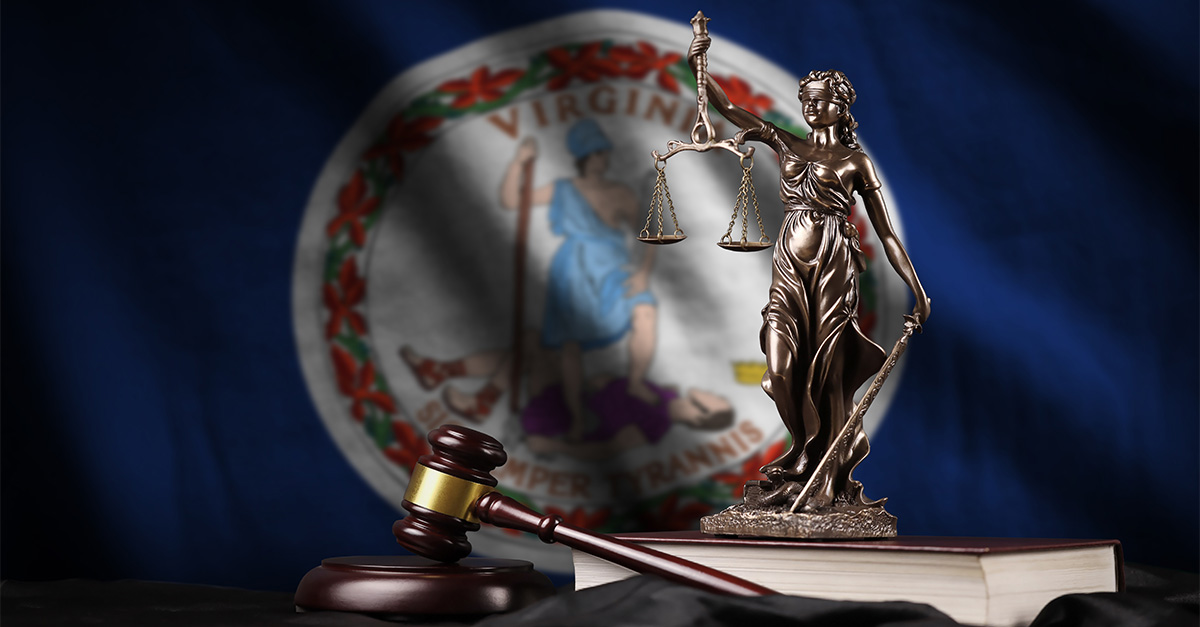


Get a free copy of Parental Rights & Education when you subscribe to our newsletter!

UPDATE: The Virginia Supreme Court has ruled that a case brought by Peter Vlaming, a former teacher who was fired for refusing to use a transgender student’s preferred pronouns, may proceed after the circuit court had dismissed it.
The court found that “Absent a truly compelling reason for doing so, no government committed to these principles can lawfully coerce its citizens into pledging verbal allegiance to ideological views that violate their sincerely held religious beliefs.”
Vlaming taught French at West Point High School and received positive evaluations during his six-year-long teaching career there. In 2018, one of Vlaming’s students, a girl, began identifying as a boy. Vlaming’s religious and philosophical beliefs are that biological sex is fixed at conception and cannot be changed. Vlaming believed that using masculine pronouns to refer to the student was lying. Vlaming avoided using third-person pronouns in his classes and used the student’s chosen French name; however, he refused to use masculine pronouns.
The school administrators insisted that he use masculine pronouns or risk termination. After accidentally referring to the student with the pronoun “her,” the student withdrew from the class and school officials demanded Vlaming use the student’s preferred pronouns. He refused and was terminated.
Vlaming filed suit, but a circuit court dismissed his filing. Represented by Alliance Defending Freedom (ADF), Vlaming appealed to the Virginia Supreme Court, which on Thursday, ruled that his suit could proceed.
Vlaming’s case, which rests entirely on the state constitution of Virginia, claimed that the school district violated his right to the free exercise of religion. As the court noted, the Constitution of Virginia, specifically Article 1, Section 16, supplies greater protection for religious exercise than even the First Amendment of the U.S. Constitution. It reads in part,
“That religion or the duty which we owe to our Creator, and the manner of discharging it, can be directed only by reason and conviction, not by force or violence; and, therefore, all men are equally entitled to the free exercise of religion, according to the dictates of conscience; and that it is the mutual duty of all to practice Christian forbearance, love, and charity towards each other. No man shall be compelled to frequent or support any religious worship, place, or ministry whatsoever, nor shall be enforced, restrained, molested, or burthened in his body or goods, nor shall otherwise suffer on account of his religious opinions or belief; but all men shall be free to profess and by argument to maintain their opinions in matters of religion, and the same shall in nowise diminish, enlarge, or affect their civil capacities.”
The Court then wrote in its ruling,
“The essential character of this jurisprudential view seeks to protect diversity of thought, diversity of speech, diversity of religion, and diversity of opinions. Our Constitutional Republic, framed upon principles of classical liberalism, cannot be true to itself if it curates between those who can and those who cannot participate in the public marketplace of ideas and retreat, when necessary, to the private sanctuary of conscience. Absent a truly compelling reason for doing so, no government committed to these principles can lawfully coerce its citizens into pledging verbal allegiance to ideological views that violate their sincerely held religious beliefs.”
Chris Schandevel, senior counsel for ADF, celebrated what legal observers are calling a landmark ruling, stating,
“The West Point School Board violated that constitutional command when it tried to force Vlaming to endorse the school’s ideological viewpoints on gender identity. And the Virginia Supreme Court rightly vindicated Vlaming’s right to stand by his convictions in its decision.”
{Originally published on November 8, 2022} Last Friday, Alliance Defending Freedom (ADF) attorneys asked the Virginia Supreme Court to reinstate a teacher who was fired for refusing to use a transgender student’s preferred pronouns after a lower court dismissed his case.
Peter Vlaming, a French teacher at West Point High School, was fired in 2018 after a female student in his class began using a male name and pronouns and the school demanded that Vlaming address her accordingly. Vlaming chose to avoid using pronouns, though he did use the student’s chosen masculine name. That didn’t satisfy the school, who issued a written notice requiring him to stop avoiding using pronouns and to use masculine pronouns when referring to the student.
“I was given a written ultimatum by the superintendent that said if I continued substituting the student’s new name, though it’s a masculine name, and I was using it instead of using, when I could use a male pronoun, that too would be grounds for my dismissal, my being fired, which is the definition of the thought police,” Vlaming said. “Because who’s going to say, ‘Oh, yeah, right now he’s substituting there when he could be using a male pronoun’? So, it was really coercing me to adopt a new ideology about human nature that I wasn’t going to do,”
The former teacher was even told he could be fired for referring to the student with female pronouns even if no students were around.
Vlaming refused and at one point accidentally referred to the student as “her,” later that day he was fired.
“You can’t compel someone to believe, particularly in an ideology,” he said, “this has nothing to do with curriculum. This is, ‘OK. You have to parrot what we say and to show that at least feign belief in this new thing.’ And I thought, ‘No, this is America. We don’t do that here.’” Then he contacted ADF.
ADF has represented several plaintiffs in such cases, including fellow Virginia teachers Monica Gill, Kim Wright, and Tanner Cross. Cross, for example, was fired after he spoke at a board meeting in opposition of a Loudoun County policy requiring teachers to use a student’s preferred pronouns. The state’s Supreme Court upheld a lower court decision that required Loudoun County to reinstate Cross.
ADF also represented Dr. Nick Merriwether, a professor at Shawnee State University who was disciplined after refusing to use a feminine pronoun for a male student. The U.S. Court of Appeals for the Sixth Circuit ruled that the school violated Merriwether’s rights, and Shawnee State has agreed to a $400,000 settlement.
Chris Schandevel, senior counsel for ADF, said,
“Peter wasn’t fired for something he said, he was fired for something he couldn’t say. As a teacher, Peter was passionate about the subject he taught, he was well-liked by his students, and he did his best to accommodate their needs and requests. But Peter could not in good conscience speak messages that he doesn’t believe to be true. We hope the Virginia Supreme Court will agree that by firing him for those beliefs, the school board violated Peter’s rights under the Virginia Constitution and state law.”
The Virginia Constitution offers protection from reprisal based on religious belief. Article 1, Section 16 states that,
“…religion or the duty which we owe to our Creator, and the manner of discharging it, can be directed only by reason and conviction, not by force or violence; and, therefore, all men are equally entitled to the free exercise of religion, according to the dictates of conscience; and that it is the mutual duty of all to practice Christian forbearance, love, and charity towards each other.”
In addition, it says:
“No man shall be compelled to frequent or support any religious worship, place, or ministry whatsoever, nor shall be enforced, restrained, molested, or burthened in his body or goods, nor shall otherwise suffer on account of his religious opinions or belief; but all men shall be free to profess and by argument to maintain their opinions in matters of religion, and the same shall in nowise diminish, enlarge, or affect their civil capacities.”
When asked why he chose to stand and fight, Vlaming answered,
“There are some hills that are worth dying on and this is one of them. When you have your superiors who are telling you, ‘OK, you have to promote this with your speech in order to stay here’ and it contradicts your core belief in who we are as human beings — I’m a Christian and I do believe the biblical account of how we were made and who we are. We’re integral beings. We’re body, soul, and spirit, and that we were created man and woman. And, so, to be told that I must deny that very basic fundamental belief, Christian belief, in order to stay in the school system, sooner or later you have to say, ‘No, I’m not going to do that. There are things that are more important.’”

As this case shows, it isn’t just that the school is compelling speech, it’s compelling religion. Pro-gender affirmation ideology is a religious view. Forcing teachers to express a view on human sexuality that says gender is separate from biological sex isn’t a neutral act but the government taking a stance on a core aspect of religion. Schools can claim that they love students and want to protect them from discrimination, but if they cared about the well-being of those students, they would recognize that affirming their gender transition is not loving.
As we have discussed recently, the medical community in other countries has started to recognize that pushing gender affirmation is not wise. Most youth would accept their biological sex if not encouraged to transition. What children and teenagers need are the care and concern to help them become comfortable with their sex, not tell them they need treatments and surgeries to fundamentally change who they are.
As Daniel refused to stop praying to God and as Shadrach, Meshach, and Abednego refused to bow to the image, Christians must refuse to give in to the demands of a culture that contradict Scripture.
Whether about transgender ideology or any other issue, compelled speech is harmful and it’s unconstitutional. Hopefully, the court system will affirm the freedom of speech and the free exercise of religion.
The Church must be involved in public discourse and influence. That’s why we write — so our readers can be equipped to understand and pursue righteous change in the world. For more timely, informative, and faith-based content, subscribe to the Standing for Freedom Center newsletter.
Christian conservative news and issues that matter. Curated just for you!
